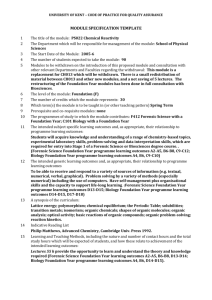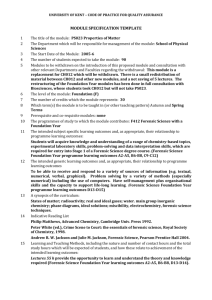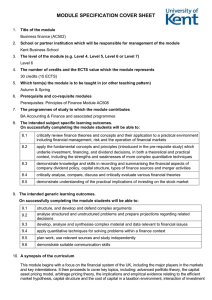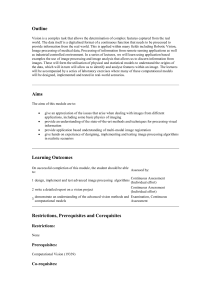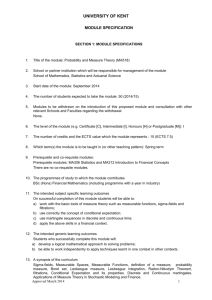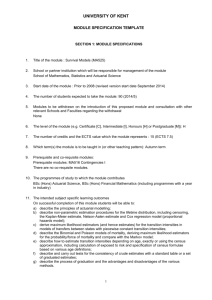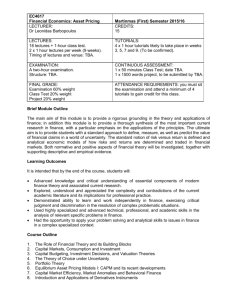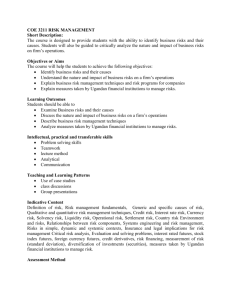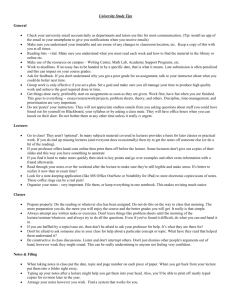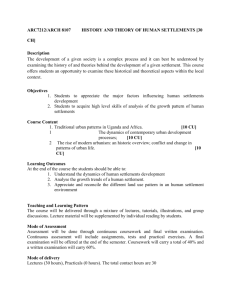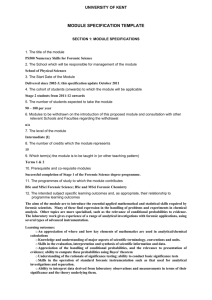University of Kent at Canterbury
advertisement
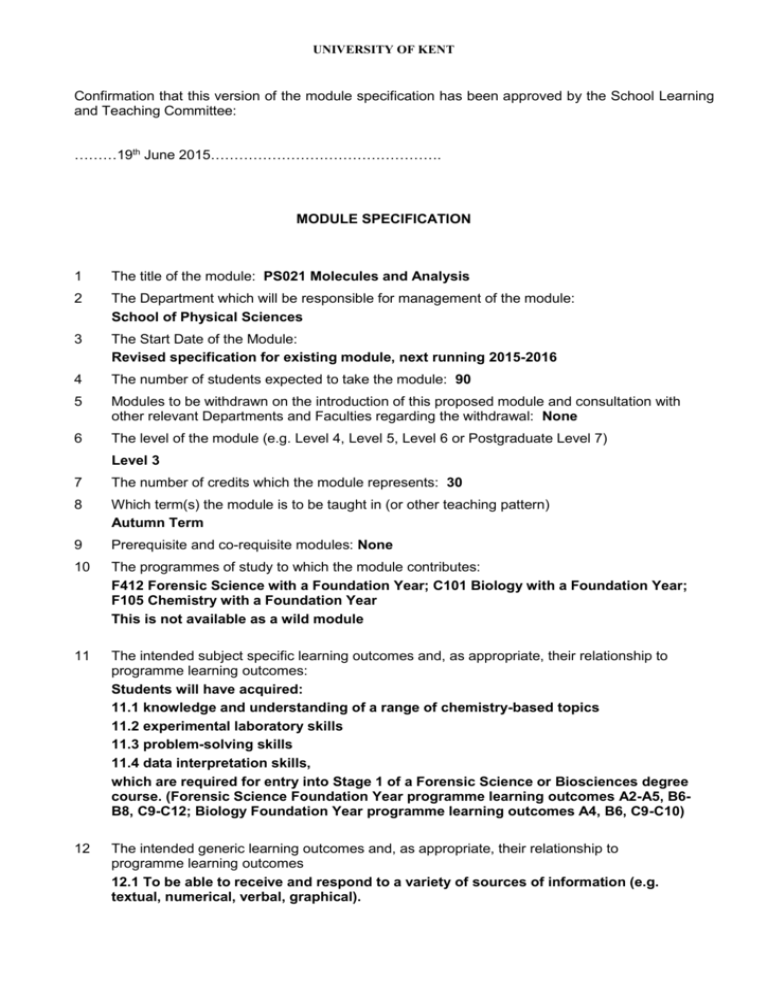
UNIVERSITY OF KENT Confirmation that this version of the module specification has been approved by the School Learning and Teaching Committee: ………19th June 2015…………………………………………. MODULE SPECIFICATION 1 The title of the module: PS021 Molecules and Analysis 2 The Department which will be responsible for management of the module: School of Physical Sciences 3 The Start Date of the Module: Revised specification for existing module, next running 2015-2016 4 The number of students expected to take the module: 90 5 Modules to be withdrawn on the introduction of this proposed module and consultation with other relevant Departments and Faculties regarding the withdrawal: None 6 The level of the module (e.g. Level 4, Level 5, Level 6 or Postgraduate Level 7) Level 3 7 The number of credits which the module represents: 30 8 Which term(s) the module is to be taught in (or other teaching pattern) Autumn Term 9 Prerequisite and co-requisite modules: None 10 The programmes of study to which the module contributes: F412 Forensic Science with a Foundation Year; C101 Biology with a Foundation Year; F105 Chemistry with a Foundation Year This is not available as a wild module 11 The intended subject specific learning outcomes and, as appropriate, their relationship to programme learning outcomes: Students will have acquired: 11.1 knowledge and understanding of a range of chemistry-based topics 11.2 experimental laboratory skills 11.3 problem-solving skills 11.4 data interpretation skills, which are required for entry into Stage 1 of a Forensic Science or Biosciences degree course. (Forensic Science Foundation Year programme learning outcomes A2-A5, B6B8, C9-C12; Biology Foundation Year programme learning outcomes A4, B6, C9-C10) 12 The intended generic learning outcomes and, as appropriate, their relationship to programme learning outcomes 12.1 To be able to receive and respond to a variety of sources of information (e.g. textual, numerical, verbal, graphical). UNIVERSITY OF KENT 13 14 12.2 Problem solving by a variety of methods (especially numerical) including the use of computers. 12.3 Have self-management plus organisational skills and the capacity to support lifelong learning. (Forensic Science Foundation Year programme learning outcomes D13-D15; Biology Foundation Year programme learning outcomes D14-D15, D17-D18) A synopsis of the curriculum: Atoms and molecules; chemical equations; titrations; energy levels; acids and bases; orbitals; bonds; molecular shapes; spectra; bond energies, hydrogen bonding. Indicative Reading List Philip Matthews, Advanced Chemistry, Cambridge Univ. Press 1992. Burrows et al., Chemistry3: Introducing inorganic, organic and physical chemistry, 2nd Edition, Oxford University Press (2013) 15 Learning and Teaching Methods, including the nature and number of contact hours and the total study hours which will be expected of students, and how these relate to achievement of the intended learning outcomes: Lectures 55 h provide the opportunity to learn and understand the theory and knowledge required (11.1, 11.3, 12.1, 12.2, 12.3). Lectures are divided into 11 groups of 5, each group focussing on critical coverage of a self-contained section of the course textbook and completed in a week. Students are expected to study the relevant chapters of the textbook before the lectures. Each group of lectures has an element of continuous assessment in the form of a problem sheet or written test. The carefully paced syllabus, focused on a single textbook, with its emphasis on coursework assessed on a weekly basis, has been proven by experience to be a highly appropriate form of teaching at the Foundation Year level to promote the achievement by students of the learning outcomes of the module. Laboratory classes 24h provide hands-on experience of a range of important experimental laboratory skills, good laboratory safety practice, use of scientific instruments, mathematical calculations, and report writing (11.1, 11.2, 11.4, 12.1, 12.2, 12.3). Private study 218h reading lecture notes and books, laboratory write-ups, revision (11.1-11.4, 12.1-12.3). Examinations (class examination and end-of-year examination) 3h 16 Assessment methods and how these relate to testing achievement of the intended learning outcomes: Assessment of the module will be by coursework (40%) and end-of-year examination (length 2 hours) (60%). The coursework will comprise the following components: Weekly written or online coursework set in lectures (20%) (11.1, 11.3, 11.4, 12.1, 12.2, 12.3) Laboratory work (12%) (11.1, 11.2, 11.4, 12.1-12.3) Class examination (8%) (11.1, 11.3. 11.4, 12.1-12.3) The emphasis on coursework, continuously assessed on a carefully-paced weekly basis, is of proven effectiveness in contributing to students’ achievement of learning outcomes at Foundation Year level, enabling them to monitor their own progress. The class examinations have a similar format to the end-of-year examinations and give UNIVERSITY OF KENT practice in examination technique which is especially valuable for Foundation Year students. The end-of-year written examination will be a single two-hour unseen paper comprising 22 compulsory questions (2 per group of 5 lectures) in multiple-choice or short-answer format. This examination structure is designed to ensure that students have achieved knowledge and understanding covering the whole of the module syllabus (11.1-11.4, 12.1-12.3). This is especially desirable at Foundation Year level. 17 Implications for learning resources, including staff, library, IT and space: None 18 A statement confirming that, as far as can be reasonably anticipated, the curriculum, learning and teaching methods and forms of assessment do not present any non-justifiable disadvantage to students with disabilities The School recognises and has embedded the expectations of current disability equality legislation, and supports students with a declared disability or special educational need in its teaching. Within this module we will make reasonable adjustments wherever necessary, including additional or substitute materials, teaching modes or assessment methods for students who have declared and discussed their learning support needs. Arrangements for students with declared disabilities will be made on an individual basis, in consultation with the University’s disability/dyslexia support service, and specialist support will be provided where needed. 19. Campus(es) where module will be delivered: Canterbury
